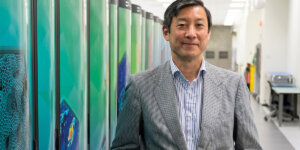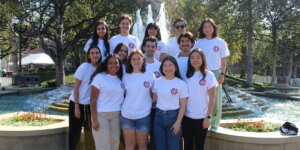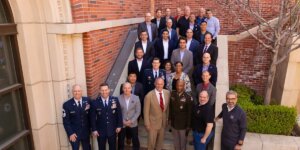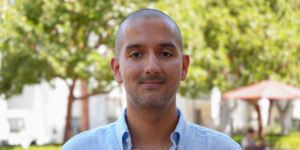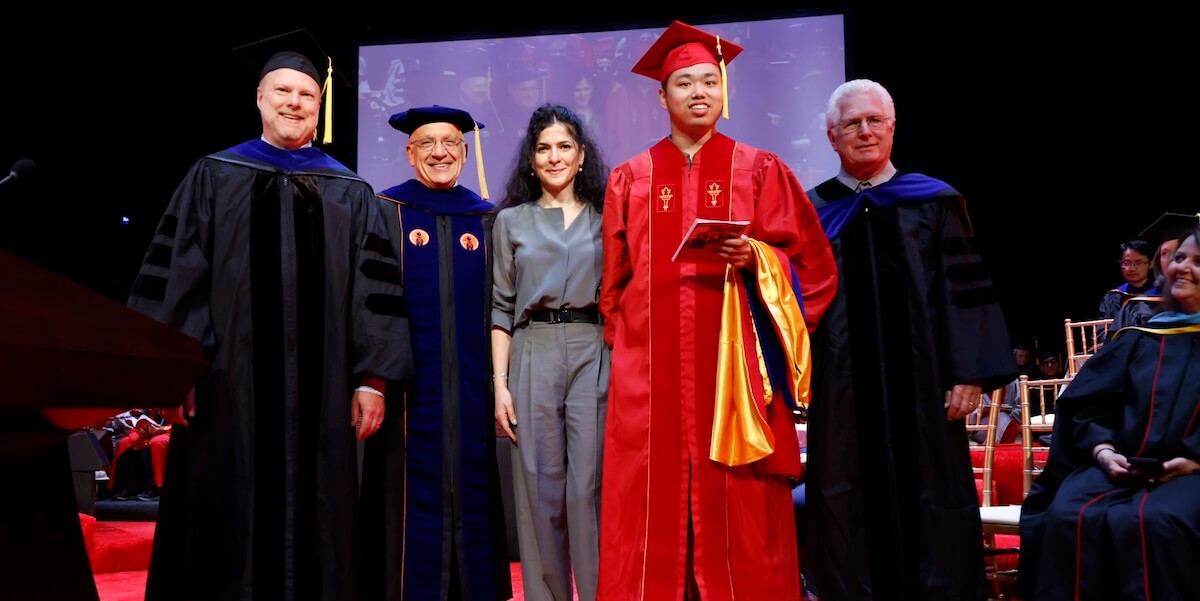
(Left to Right) Erik Johnson, Vice Dean for Academic Programs, Dean Yannis C. Yortsos, Professor Eva Kanso, Haotian Hang, winner of the William F. Ballhaus, Jr. Prize for Excellence in Graduate Engineering Research, and William Ballhaus, Jr. (Photo/Noe Montes)
Julie Jiang experienced several challenges on her way to earning her Ph.D. in computer science at the USC Viterbi School of Engineering. The COVID-19 pandemic struck during the second semester of her doctoral program, robbing her of the chance, she said, to “build in-person connections during a formative time.”
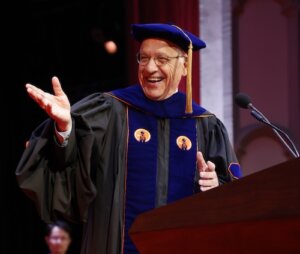
Dean Yannis C. Yortsos (Photo/Noe Montes)
As is her wont, she persevered. However, Jiang, Ph.D. CS ’24, hit another bump when she submitted an academic paper to several journals that would become the basis for her thesis. Stung by seven rejections over the course of a year, Jiang felt like giving up until her adviser, Emilio Ferrara, associate chair at the Thomas Lord Department of Computer Science and principal scientist at the Information Sciences Institute, “knocked some sense into me and reminded me that this kind of experience is completely normal in research.”
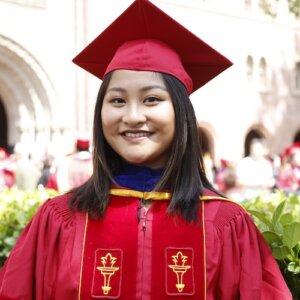
Julie Jiang (Photo/Noe Montes)
Jiang said she’s glad that she heeded his advice. Not only did Jiang eventually present her paper at a prestigious ICWSM conference, but in 2024 Forbes magazine named her a 30 Under 30 in Science for her work on social behavior on digital platforms. She also said she treasured her time at USC Viterbi.
Now working as a machine learning research scientist at Meta, Jiang was one of five finalists for the best USC Viterbi Ph.D. dissertation award for 2024 – the William F. Ballhaus, Jr. Prize for Excellence in Graduate Engineering Research. Her dissertation examined how and why people behave – or misbehave – online and possible ways to improve those interactions. “The big idea is: If we can understand how people connect and communicate online, we can help make those spaces kinder, more open, and more thoughtful,” she said.
On Wednesday, May 14, 2025, 150 newly minted Ph.D.s and their families gathered at Bovard Auditorium sporting cardinal and gold hoods, a tradition that dates to 12th century monks. This year’s graduates represent countries ranging from China, India, Greece, Taiwan, Turkey, Egypt and the U.S.
USC Viterbi Dean Yannis C. Yortsos complimented the enthusiastic students for their love of learning and creativity.
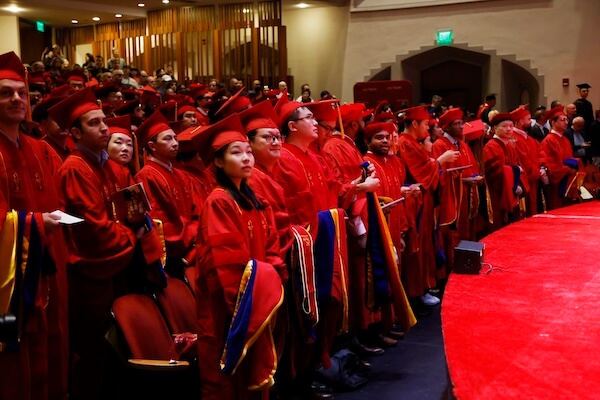
Newly minted Ph.D.s (Photo/Noe Montes)
“As Socrates said: ‘Education is the kindling of a flame, not the filling of a vessel.’ My hope for all of you is that your time at USC helped the kindling of a flame that will burn brightly all your life,” he said. “That flame will hopefully give warmth to other places, cities, industries, and maybe even worlds.”
Added Yortsos: “In his new book, ‘Nexus: A Brief History of Information Networks from the Stone Age to AI,’ Yuval Noah Harari writes that stories are arguably the greatest human invention. (Of course, he has not heard of the Viterbi Algorithm.) People need stories in order to cooperate on a mass scale.
“So, what is the story that connects us here today? It is the story you wrote in your thesis, the thread and narrative you weaved in your dissertation. Where you have reimagined the world, and created a world that never was.”
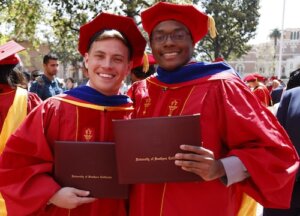
Ph.D. graduates celebrating (Photo/Noe Montes)
Haotian Hang, a mechanical engineering Ph.D., took home the USC Viterbi Ph.D. dissertation award for his work titled “Underwater Navigation Strategies and Emergent Collective Behavior in Bioinspired Swimmers.” Hang developed unsteady-flow models to enhance the energy-efficiency of underwater vehicles and create a cohesive and cooperative robot swarm. Eva Kanso, Zohrab A. Kaprielian Fellow in Engineering and Professor of Aerospace and Mechanical Engineering and Physics and Astronomy, served as Hang’s adviser.
Hang looks back fondly at his time at USC Viterbi.
“Throughout my Ph.D., there were countless rewarding moments: mastering a new technique, finally debugging a stubborn piece of code, using elegant theory to explain simulation results and swapping ideas with colleagues at conferences,” he said.
In addition to Jiang and Hang, the other Ballhaus Prize finalists included:
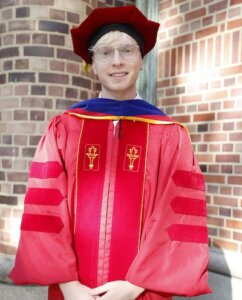
Nathan Dennler (Photo/Noe Montes)
- Nathan Dennler, a 2024 computer science Ph.D., who wants to create personalized robots that can interact with many people and learn each user’s particular likes and dislikes, such as communication preferences, rehabilitation styles, and robot appearances.
- Zerui Liu, Ph.D. ECE ’24, who developed a “tiny brain” for drones, medical devices, self-driving cars and other smart machines to allow them to make faster and better decisions without the aid of a giant computer.
- Selin Bac, a 2024 Ph.D. in chemical engineering, who specializes in computational methods to study how catalysts evolve while driving chemical reactions and who improves the efficiency of these calculations to facilitate catalyst design for sustainable applications.
Executive Vice Dean Gaurav Sukhatme, who also serves as the founding director of the School of Advanced Computing, explained how SAC responds to the need for new pedagogical and research approaches in a rapidly changing world.
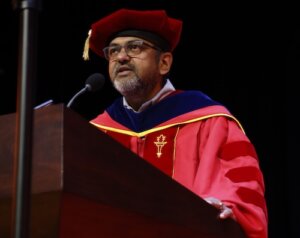
Executive Vice Dean Gaurav Sukhatme (Photo/Noe Montes)
“Technology has always led to social change. Today, this is happening at unprecedented speed. The revolution in modern computing, powered by algorithms, chips, and data, is the center of these changes. These recent rapid advances, particularly in artificial intelligence, call for a rethink in how we at the university should teach and how we should frame our research,” he said. “The new USC School of Advanced Computing – or SAC – is our answer to this call.”
The future looks bright for the Ph.D. graduates, many of whom will stream into academia, industry or the government.
For instance, Liu now works at Apple, exploring new technologies and developing next-generation products. Dennler is employed by Uber as a machine learning engineer. Hang is undertaking postdoctoral research at USC, while Bac is a postdoc at UC Santa Barbara.
Dean Yortsos ended his address by telling the graduates that he expected them to make a difference.
“In an era where discovery is extraordinarily fast, your work already broadens the shoulders on which to further build a better world,” he said.
Published on May 15th, 2025
Last updated on May 15th, 2025




